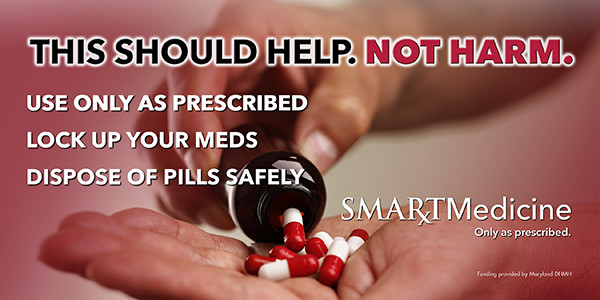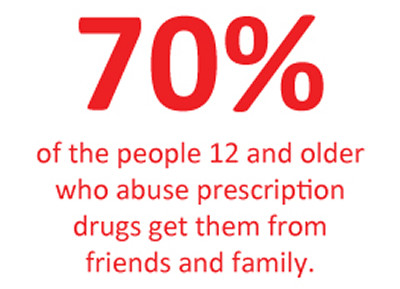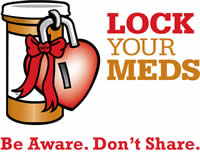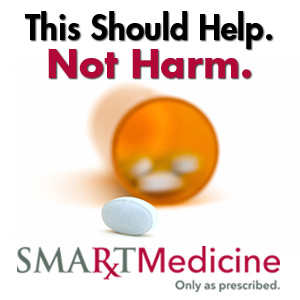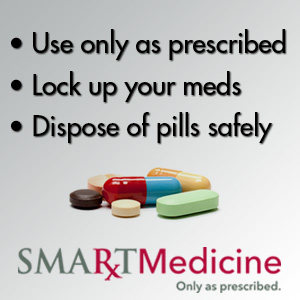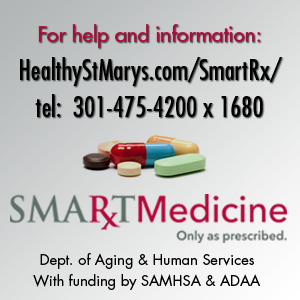Responsible Medication Management
Abuse of prescription medication is a growing national epidemic. This growth is fueled in part by misconceptions about prescription drug safety and increased availability.
How can you help?
1. Lock Your Meds– Be aware. Don’t Share
Lock Your Meds® is a national multi-media campaign designed to reduce prescription drug abuse by making adults aware that they can be the “unwitting suppliers” of prescription medications being used in unintended ways, especially by young people. Many valuable resources are available for parents and adults at: www.lockyourmeds.org/
2. Dispose of Unused Medications
Community members can help in the effort to reduce prescription drug abuse rates by properly disposing of medications through participation in the St. Mary’s County Medication Drop-Off Program. Through this program, residents may safely dispose of unused or expired medications in the collection boxes that are available 24 hours a day, seven days a week in the front lobby of the St. Mary’s County Sheriff’s Office in Leonardtown. Any unwanted medications, prescribed or over-the-counter, may be discarded in the drop-box and all deposits through this program are completely anonymous.
Proper disposal of prescription medications protects our community in many ways. It prevents poisoning of children and pets, deters misuse and abuse by youth and adults, and avoids health problems from accidentally taking the wrong medicine, too much of the same medicine, or a medicine that is too old to work well. However, the primary goal of community medication collection is to keep controlled dangerous substances (CDS) off the streets. Examples of controlled dangerous substances include: narcotics, depressants, and stimulants that are manufactured for legitimate medical use, but have the potential for misuse or abuse.
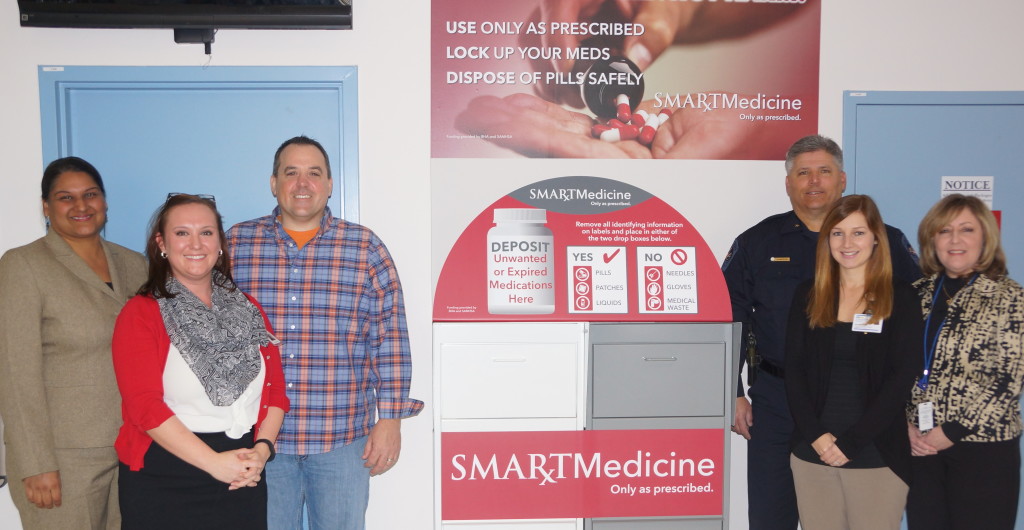
Since the medication collection began in 2011, a total of 601,015 pills, 525 CDS pain patches and 58 bottles of CDS liquids to date have been safely disposed of and diverted from potential misuse in the community.
- Other Maryland Drop-off Sites
- DEA Guidelines and Info for drug drop-off and medicine disposal
- Other ways to dispose of medicines properly
3. Get Help & Information
- 24/7 Referral: 800-662-HELP (4357)
- Walden Sierra: Website- http://www.waldensierra.org/; Hotline- 888-912-7366
- Family Access Center: 301-866-5332
- SAMHSA Treatment Locator: http://findtreatment.samhsa.gov/
- National Institute on Drug Abuse: http://www.drugabuse.gov/
In January 2013, the Maryland Department of Health and Mental Hygiene released the Maryland Opioid Overdose Prevention Plan, a statewide strategy for reducing overdose deaths related to pharmaceutical opioids and heroin. As a result, the Maryland Alcohol and Drug abuse Administration began developing Overdose Prevention resources, including events, data and reports , local overdose prevention plans, opioid overdose prevention toolkits, and information on safe medication disposal.
Locally, the St. Mary’s County Department of Aging and Human Services established an Overdose Prevention Workgroup tasked with developing and implementing a local plan to reduce fatal and non-fatal opioid related overdoses. The workgroup is comprised of representatives from the Department of Aging and Human Services; St. Mary’s County Health Department; Medstar St. Mary’s Hospital; Walden Sierra; St. Mary’s County Sheriff’s Office; St. Mary’s County Detention Center; and local pharmacies including St. John’s Pharmacy. This group later transitioned into the Behavioral Health Action Team (BHAT) of the Healthy St. Mary’s Partnership. The BHAT is comprised of community members and organizations working together to improve behavioral health (mental health and substance misuse) outcomes for all St. Mary’s County residents. Local strategies include outreach to identified high risk populations, education and awareness to the general public and clinical communities, and a local media campaign.
SMART Medicine is the local media campaign, designed to generate awareness on the rising issue of opioid misuse, abuse, and overdose, as well as to provide information and resources on the safe management of prescription medications. By committing to a few simple practices we can go a long way in taking steps toward reducing opioid related misuse, abuse and overdoses and better ensuring that prescription medications, when taken only as prescribed, are able to “Help, and not Harm.”

